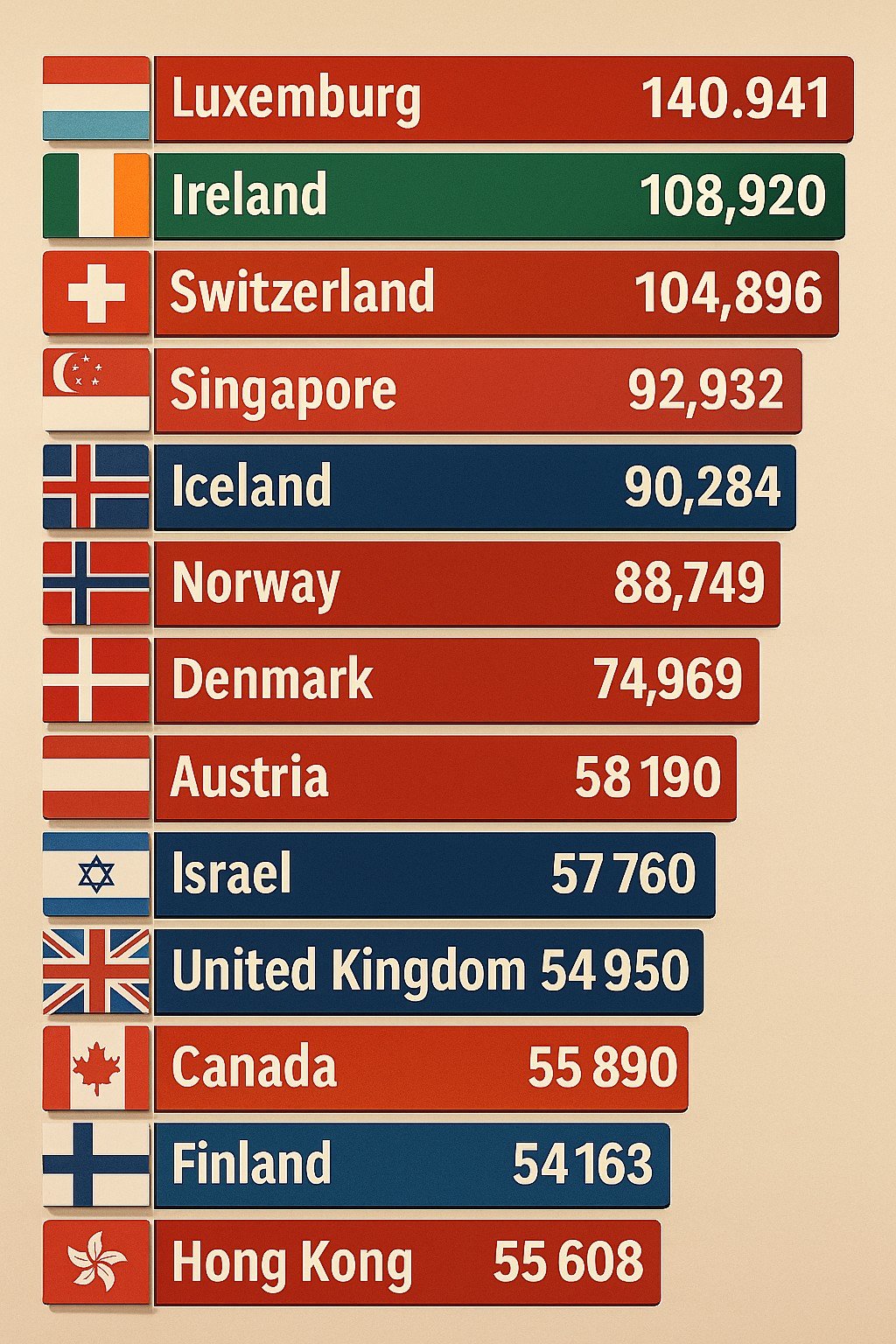The Israel economy stands as one of the world’s most remarkable success stories. With a GDP per capita of approximately $52,000-$58,000, Israel ranks among the top 15 wealthiest nations globally. However, this impressive figure tells only part of the story.
Behind the economic success lies a complex reality of innovation and inequality. The Israel economy thrives on cutting-edge technology and entrepreneurial spirit, yet struggles with significant wealth gaps and social challenges.
What makes this small Middle Eastern nation so economically powerful? The answer lies in a unique combination of factors: world-class technology sectors, a culture of innovation born from military necessity, strategic government policies, and an entrepreneurial ecosystem that has earned Israel the nickname “Startup Nation.” Yet this same economy faces challenges from geopolitical tensions, social inequality, and demographic pressures.
This comprehensive guide explores every aspect of Israel’s economic landscape, from the technology giants that drive growth to the inequality challenges that threaten long-term stability. We’ll examine how military service creates tech entrepreneurs, why multinational corporations invest billions in Israeli R&D, and what the future holds for this innovation powerhouse.

What Makes the Israel Economy So Powerful?
Technology Sector: The Crown Jewel
The Israel economy owes much of its success to its technology sector, which contributes over 18% of GDP and 50% of exports. This dominance didn’t happen overnight.
Cybersecurity Leadership Israel’s dominance in cybersecurity didn’t happen by accident—it emerged from existential necessity. As a small nation surrounded by hostile neighbors, Israel faced constant cyber threats decades before most countries even recognized the digital battlefield. Palestinian hackers began targeting Israeli websites in the 1990s, Iranian cyber units have continuously probed Israeli infrastructure, and state-sponsored attacks from various regional adversaries forced Israel to develop world-class defensive capabilities.
This defensive expertise naturally evolved into commercial opportunity. Companies like Check Point Software, CyberArk, and Checkpoint have become household names in corporate security, built on technologies first developed to protect Israeli infrastructure. The cybersecurity sector alone generates over $8 billion annually for the Israel economy, with Israeli companies controlling approximately 20% of the global market.
Artificial Intelligence Innovation Over 1,400 AI companies operate within Israel’s borders. Major tech giants including Google, Microsoft, and Intel have established significant AI research centers in Israel. These investments pump billions into the Israel economy each year.
Semiconductor Excellence Intel’s largest development center outside the United States operates in Israel, employing over 13,000 people. The company has invested more than $50 billion in Israeli operations since 1974. This single relationship demonstrates how international partnerships fuel the Israel economy.
Life Sciences and Pharmaceuticals
The pharmaceutical sector represents another pillar of the Israel economy. Teva Pharmaceutical Industries, the world’s largest generic drug manufacturer, generates annual revenues exceeding $15 billion.
Beyond Teva, over 1,400 life sciences companies operate in Israel. These firms focus on:
- Medical devices and equipment
- Biotechnology research
- Digital health solutions
- Precision medicine
The life sciences sector employs approximately 85,000 people and contributes $5 billion annually to exports.
Energy Revolution
The discovery of natural gas transformed the Israel economy’s energy profile. The Tamar field, discovered in 2009, contains an estimated 10 trillion cubic feet of natural gas. The larger Leviathan field holds approximately 22 trillion cubic feet.
These discoveries generated several economic benefits:
- Energy independence reduced import costs by $3 billion annually
- Export revenues from gas sales to Egypt and Jordan
- Lower electricity costs for Israeli consumers
- New job creation in the energy sector
Defense and Aerospace Industry
Israel’s defense industry represents more than just economic activity—it’s the product of seven decades of regional conflict that forced rapid technological innovation. Surrounded by hostile neighbors since its founding, Israel couldn’t rely on foreign military suppliers during crises. This isolation bred self-reliance and innovation out of survival necessity.
The 1973 Yom Kippur War served as a turning point. When the United States imposed an arms embargo during the conflict, Israel realized it needed indigenous defense capabilities. This led to the development of advanced fighter jets (like the IAI Lavi), missile defense systems (culminating in Iron Dome), and sophisticated electronic warfare technologies.
Today, this survival-driven innovation generates substantial economic returns. The defense sector contributes approximately $9 billion annually to the Israel economy. Major companies include:
Israel Aerospace Industries (IAI) with $4 billion in annual revenues, Rafael Advanced Defense Systems specializing in Iron Dome technology with $2.5 billion revenues, and Elbit Systems focusing on drones and electronic warfare with $4.6 billion in revenues.
What makes these companies economically significant is their dual-use technology. Innovations developed for military applications frequently find civilian markets, creating a continuous pipeline from defense research to commercial products.
These established sectors form the foundation of the Israel economy’s success. However, what truly sets Israel apart from other developed nations is how these traditional industries spawned an extraordinary entrepreneurial ecosystem. The technology expertise developed in defense companies, the innovation mindset fostered by energy discoveries, and the global connections built through pharmaceutical exports all contributed to creating something unprecedented: a startup culture that transforms entire industries.
Why the Israel Economy Became the “Startup Nation”
Military Technology Foundation
The Israel Defense Forces (IDF) serves as an unlikely business school, but understanding how requires looking at the unique structure of Israeli military service. Unlike most armies that focus primarily on combat training, the IDF operates as a massive technology incubator where 18-year-olds receive world-class training in cutting-edge fields.
Unit 8200: The Intelligence Factory Unit 8200, Israel’s signals intelligence unit, functions like a prestigious university program combined with hands-on corporate training. Recruits undergo rigorous selection processes—only 3% of applicants are accepted—followed by intensive technical education. They learn advanced mathematics, computer science, cryptography, and data analysis while working on real-world intelligence challenges.
What makes this military service entrepreneurially valuable is the responsibility given to young soldiers. A 20-year-old Unit 8200 officer might manage a team of analysts, oversee multi-million dollar technology projects, and make decisions that affect national security. This level of responsibility is unprecedented in civilian organizations for people of similar age.
The Talpiot Program: Creating Technical Leaders The Talpiot program takes this concept even further. These elite soldiers earn university degrees in physics, mathematics, or computer science while serving, then spend years working on the military’s most advanced technological projects. They learn to think systematically about complex problems, manage large-scale technical projects, and understand how to translate theoretical knowledge into practical applications.
Real-World Business Training Military service provides practical business skills that universities often overlook. Soldiers learn to work under extreme pressure, make decisions with incomplete information, manage diverse teams, and adapt quickly to changing circumstances. They also develop extensive networks of technically skilled peers who often become business partners or early employees in startups.
This military-to-business pipeline has produced remarkable results. Unit 8200 alumni founded companies worth over $1 trillion combined, including Palo Alto Networks (valued at $60 billion), Check Point Software, and dozens of successful startups. The military service doesn’t just teach technical skills—it creates entrepreneurs who understand both technology and leadership.
Cultural Advantages
Several cultural factors drive startup success in the Israel economy:
Chutzpah Culture Israeli entrepreneurs embrace calculated risk-taking. This cultural trait encourages innovation and rapid decision-making in business environments.
Flat Hierarchies Israeli companies typically maintain informal structures. Junior employees regularly challenge senior management, fostering creative problem-solving.
Global Mindset With only 9 million domestic consumers, Israeli startups must think internationally from day one. This global perspective helps companies scale rapidly.
Government Support Systems
The Israeli government actively supports the startup ecosystem through various programs:
Innovation Authority Funding
- Annual budget: $500 million
- Supports over 1,000 projects yearly
- Focus areas: Deep tech, life sciences, cleantech
Tax Incentives
- R&D tax credits up to 12% of eligible expenses
- Preferred Enterprise status for qualifying companies
- Capital gains tax exemptions for certain investments
Venture Capital Ecosystem
The Israel economy benefits from a mature venture capital industry:
- Over 70 active VC funds
- Annual investments exceeding $7 billion
- Average deal size: $15 million
- Success rate: 1 in 4 startups achieve exit
Public Finance: The Challenge of Balancing Growth and Security
The Israel economy faces a unique fiscal challenge that few other developed nations experience: maintaining economic growth while dedicating substantial resources to national security.
Israel’s national debt stands at approximately 73-75% of GDP, totaling around $350 billion. Unlike many countries, about 70% of this debt is held domestically, which provides stability but also means Israeli savers bear the risk. The government maintains strong credit ratings (A+ to AA-) because investors trust Israel’s ability to manage its finances despite ongoing security challenges.
The most striking aspect of Israel’s budget is its defense allocation. While most developed nations spend 2-3% of GDP on defense, Israel dedicates 5-6% during peacetime and even more during conflicts. Recent military operations have pushed defense spending to 22-25% of the total government budget, forcing difficult trade-offs with social programs and infrastructure investment.
This defense burden creates a ripple effect throughout the Israel economy. High military spending can crowd out investment in education, healthcare, and social services that might otherwise reduce inequality. However, it also drives innovation in the defense technology sector, which has become a major economic engine. The challenge for policymakers is maximizing the economic benefits of defense spending while ensuring adequate resources for social needs.
The Wealth Inequality Paradox
Here lies one of the most troubling contradictions in the Israel economy: a nation that creates extraordinary wealth struggles to distribute it fairly among its citizens.
Despite Israel’s impressive $52,000-$58,000 GDP per capita, about 20-23% of Israelis live near the poverty line. This inequality is measured by the Gini coefficient, a standard economic measure where 0 represents perfect equality and 1 represents maximum inequality. Israel’s score of 0.34 places it above the OECD (Organization for Economic Cooperation and Development) average of 0.315, indicating greater income disparity than most other developed nations like Germany, France, and Canada.
The inequality manifests in stark geographic and demographic patterns. Tel Aviv’s high-tech workers earn average monthly salaries of $8,500, while residents of northern and southern regions average $5,800. This gap reflects the concentration of high-paying technology jobs in the central metropolitan area.
Cultural and demographic factors compound these disparities. In the ultra-Orthodox community, only 52% of men participate in the workforce compared to 87% in the general population, often due to religious study commitments. Among Arab-Israeli women, workforce participation reaches just 42% compared to 78% for Jewish women, reflecting both cultural factors and geographic isolation from major employment centers.
The cost of living intensifies these challenges. Housing consumes 40% of the median household income, while childcare can cost $800-1,200 monthly per child. These expenses hit lower-income families disproportionately hard, creating barriers to economic mobility that persist across generations.
For the Israel economy, this inequality represents both a moral challenge and an economic inefficiency. When significant portions of the population cannot fully participate in the high-tech boom, the entire economy loses potential talent and innovation.
Israel Economy: Future Risks and Strategic Opportunities
The Israel economy stands at a crossroads, facing both significant threats and unprecedented opportunities that will shape its next decade.
The Geopolitical Challenge
Security concerns remain the most immediate risk to economic stability. Regional conflicts don’t just consume government resources—they fundamentally alter investor confidence and business planning. When tensions escalate, tourism revenues can drop by billions, foreign investment decisions get delayed, and some multinational companies activate contingency plans to relocate operations.
The 2023 judicial reform protests demonstrated how internal political instability can impact the economy almost immediately. The shekel weakened 10% against the dollar, some tech companies began relocating operations abroad, and venture capital investments slowed as investors adopted a wait-and-see approach.
Demographic Pressures
Two demographic trends pose long-term challenges for the Israel economy. The ultra-Orthodox population doubles every 16 years, but maintains lower workforce participation rates that could constrain economic growth. Simultaneously, Israel’s population is aging, increasing healthcare and pension costs while reducing the ratio of working-age citizens supporting retirees.
The Innovation Advantage
However, these challenges are balanced by remarkable opportunities. Israel’s renewable energy transition offers the potential to become a clean technology exporter. With over 300 sunny days annually and vast desert space, Israel could generate far more solar power than it consumes, creating new export opportunities.
The Abraham Accords—the 2020 diplomatic agreements that normalized relations between Israel and several Arab nations including the UAE, Bahrain, and Morocco—have opened new markets across the Middle East. Bilateral trade with the UAE already exceeds $2.5 billion, demonstrating the economic potential of normalized regional relationships.
Perhaps most importantly, Israel’s venture capital ecosystem continues expanding. With over 70 active VC funds and annual investments exceeding $7 billion, the startup nation model shows no signs of slowing down.
The key question facing the Israel economy is whether it can leverage these opportunities while addressing its structural challenges of inequality and demographic change.
Conclusion: Balancing Growth and Equity
The Israel economy stands at a critical juncture. Its remarkable achievements in technology, innovation, and wealth creation are undeniable. With over $400 billion in annual GDP and world-leading R&D investment, Israel has established itself as a global economic force.
However, sustainable prosperity requires addressing persistent challenges. Income inequality, regional disparities, and demographic pressures threaten long-term stability. The Israel economy must evolve beyond its current success model.
Future growth depends on several key factors:
- Expanding economic opportunities beyond Tel Aviv
- Integrating all population groups into the workforce
- Diversifying beyond technology dependence
- Maintaining innovation while ensuring broad-based prosperity
The path forward requires balancing Israel’s entrepreneurial dynamism with inclusive economic policies. Success will be measured not just by GDP growth, but by how prosperity reaches all Israeli citizens.
The Israel economy’s next chapter will determine whether it remains a remarkable outlier or becomes a model for sustainable, inclusive development. The choices made today will shape economic outcomes for generations to come.





